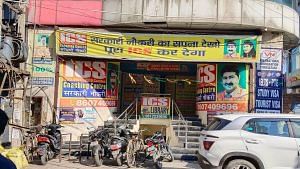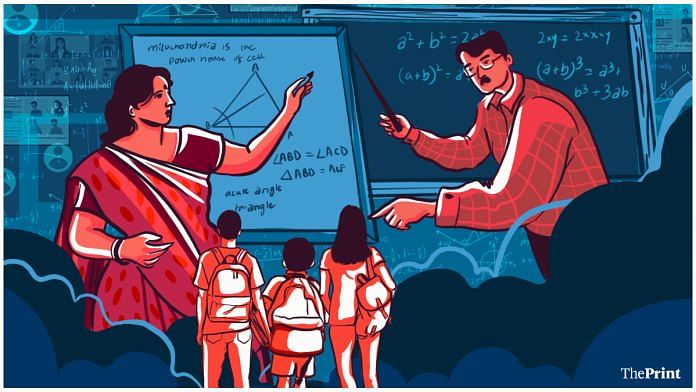Karnal: On a busy market road in Sector 12 of Karnal, Haryana, students mill around coaching classes, career counselling centres and study-abroad consultancies, poring through their notes and discussing mock tests under billboards that guarantee success. ‘Unlock the door to your destination’, reads one billboard, jostling for space with another promising to make them doctors. ‘Your preparation determines your result…Take the first step towards becoming a doctor,’ reads another. Now, the Haryana government wants to regulate the coaching industry sector, stamp out malpractice, rein in false promises, and reduce the stress of students who spend years and lakhs of rupees chasing elusive dreams.
The new Haryana Registration and Regulation of Private Coaching Institutes Act 2024—the bill was passed in the State Assembly on 28 February—will empower the government to fulfil its promise to students and parents. Coaching institutes will no longer be allowed to sell the impossible.
Haryana, however, isn’t the first state to take such an initiative. Uttar Pradesh, Manipur and Bihar also have acts in place to regulate private coaching institutes. Rajasthan, too, introduced a bill to keep the state’s coaching industry in check, but it continues to remain on the back burner.
“It has been felt that there is a need to bring a law for the registration and regulation of private coaching institutions in Haryana so as to safeguard the interest of students and their guardians,” said higher education minister Mool Chand Sharma in the draft Bill, stressing on the government’s commitment to “access, equity, quality, relevance and excellence”.

Once this Act becomes a law, private coaching institutes will have to provide details of their fee structure, students enrolled, provide proper infrastructure including separate washrooms for boys and girls, and engage at least one full-time counsellor to address the mental health needs of students. Institutes that fail to comply will be given a Rs 25,000 penalty for first-time violations, and Rs 1 lakh subsequently.
For families, many of whom take loans to pay the fees, the Act is a welcome and much-needed move in a sector plagued with malpractice, fly-by-night coaching centres, and rising student suicides.
“Parents never know about the qualifications of the teachers who are teaching in these coaching centres,” said Ashutosh Gupta, father of a student studying for one of the many competitive examinations.
“Coaching centres do not share everything with us. If the government keeps an eye on them, the quality of education here will improve, and the arbitrariness of coaching centres will also end.”
Competition and stress
The quiet and almost deserted main market road in Karnal’s Sector 6 erupts into a cacophony of chatter as students rush out of the coaching institutes in the area for their lunch break. Most of them are too busy preparing for mock tests to discuss the new Act and what it would mean to them.
Khushi, 17, is more worried about her parents’ expectations. She disappointed them when she didn’t make the cut for NEET (National Eligibility cum Entrance Test) last year, and is trying again. For students, it’s akin to juggling the worry about their careers, parents, and marks. All are worried about what their parents will say if they fail again.
“Competition gives us more stress than study. Our parents pay a lot for our education so it becomes stressful for me whenever I’m not able to do well in my tests,” says Parth Sharma, 17, who wants to become a doctor.
It’s the career his parents have chosen for him; he wants to attempt the Union Public Service Commission (UPSC) exam. “My father has forced me to do NEET. I have failed twice in this exam.”
Every year, lakhs of students who cannot afford to pay private medical and engineering college fees sit for competitive exams like the JEE (Joint Entrance Examination) and NEET. Others spend years preparing for the UPSC to join India’s civil services. In 2023 alone, nearly 13 lakh candidates appeared for the UPSC Prelims examinations—all competing for 1,255 posts. These are just the big three— there’s CLAT (Common Law Admission Test) / Law CUET (Common University Entrance Test), BBA (Bachelor of Business Administration), SSC (Staff Selection Commission), and CTET (Central Teacher Eligibility Test), to name a few.
“I had taken two exams for a government job but failed. Now I’ve joined this institute to achieve my goal. I came to study history, English and maths,” says 19-year-old Pooja as she steps out of the ICS Coaching Centre in Panipat.
Pooja, who prefers to go by her first name, hopes this will give her an edge when she attempts the competitive exam again for the third time.

With the rising number of student suicides, especially in India’s coaching hub of Kota, incidents of fire breaking out, and complaints of poor infrastructure, the sector has come under increased scrutiny. In January this year, the central government issued guidelines to regulate coaching centres. Among the many measures, the guidelines stated that institutes cannot enrol students below 16 years of age, make false promises or guarantee good marks. The guidelines also put the onus on state governments to keep a check and regulate the industry.
In a letter dated 31 July 2023, IAS officer KK Pathak asked all district magistrates to ensure coaching institutes in Bihar don’t operate during school hours (9 am to 4 pm), citing the law meant to control and regulate private coaching institutes in the state. “You are aware that a Bihar Coaching Institute (Coaching and Regulation) Act, 2020, exists. But till now, no effective steps have been taken under this law,” he said.
Also read:
Fighting irregularities
If students are worried about competition and parental expectations, then parents are worried about fees. “High fees have always been a big problem for children and parents. Paying the fees is not their only problem; most coaching centres only accept fees in cash, which is one of the biggest drawbacks of this industry. And if any outsider student comes for preparation, then these Paying Guest (PG) accommodations also leave no stone unturned in robbing them,” said Deepanshu Singh, District Coordinator for UP Mukhyamantri Abhyuday Yojana, a state government programme that provides free guidance for UPSC, NEET, JEE etc.

The rapid growth of the coaching industry has introduced several irregularities. Coaching centres, initially designed to prepare students for a competitive economy, have started competing among themselves. According to Ranganathan SVN Kondala, who teaches at a UPSC coaching centre in Delhi’s Rajendra Nagar, this internal competition has transformed students into commodities, ultimately impacting the quality of education they receive.
According to Singh, these coaching centres make big, unrealistic promises during the admissions process. They give unnecessary hope to students and parents while glossing over important details like refunds.
“I have been associated with this industry for more than 10 years and these coaching institutes never clarify terms and conditions for refund. They never give any kind of refund to students. Not even the big and renowned institutes,” he stressed.
But high fee structures aren’t the only problem plaguing this sector. Poor instruction and infrastructure are equally problematic. Coaching centres exploit the lack of ground-level investigation and monitoring by the government, said Singh. Although many of these centres have mentors and counsellors in line with government regulations, they often lack proper qualifications.

Singh also revealed how coaching centres often advertise their topper count, increasing performance pressure on aspirants. Some top achievers who hold important official positions reach out to the government DoPT (Department of Personnel and Training) to utilise their name for coaching centre advertisements.
Most centres don’t even offer decent infrastructure. Students turn to smaller coaching institutes due to money constraints, which have neither proper sitting space nor ventilation. “These institutes make 50 to 100 students sit in one room where they don’t even have any emergency exits except the narrow lanes,” said Singh.
Parents continue to rely on coaching classes to ensure a ‘bright future’ for their children. Meenu Vyas, the mother of a NEET aspirant in Karnal, says parents like her have no other option. “There is very high competition in every field. Parents like us who are less educated turn to coaching centres because they can help our children with their studies.”
(Edited by Zoya Bhatti)



